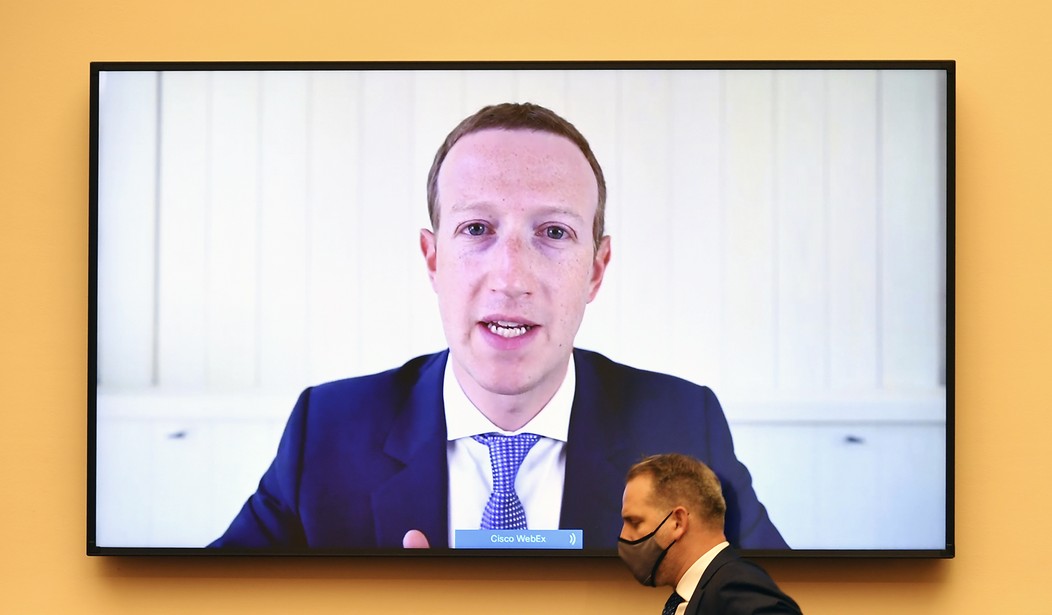Another week, another non-controversy regarding social media. Anti-social media Puritans see Frances Haugen’s cries of “Facebook’s products harm children, stoke division, and weaken our democracy,” as proof the government needs to regulatory bludgeon social media with Mjölnir-like power.
The Puritans don’t see it this way, of course. Haugen herself told the Senate’s Commerce subcommittee last Tuesday that any regulatory action amounts to “help,” because of the burning need to “stop the many harms [Facebook] is now causing.” Her opening statement’s last few sentences laid out her narrative best. “I believe we still have time to act, but we must act now. I’m asking you, our elected representatives, to act.”
Congress and the media ate it up.
MSNBC’s Chris Hayes featured former Google employee Tristan Harris discussing social media’s “race to the bottom of the brain stem for our Paleolithic responses.” Harris desires it transformed through Congress. Fellow MSNBCer Hayes Brown whose job is to “frame the news of the day for readers,” wrote Haugen’s testimony shows the congressional target needs to be the algorithms, not the information.
ABC, CBS, and FOX News took turns in moralistic clucking towards Facebook. ABC and CBS heavily pushed Haugen’s comments on Facebook’s so-called morality problem specifically within the confines of Instagram. FOX News Media Buzz host Howard Kurtz likened Haugen to Daniel Ellsberg of the Pentagon Papers because Facebook refuses to act on Instagram body shaming.
CNN’s pedagogy went further. The news network blamed two teens’ struggle with anorexia with Facebook-owned Instagram’s comment system before citing internal documents claiming “13.5% of teen girls on Instagram makes thoughts of “Suicide and Self Injury” worse.” It then asked parents “concerned about the impact Instagram is having on your children, and your own struggles to deal with it,” to share their stories.
Minnesota U.S. Senator Amy Klobuchar, whose social media antitrust bill sits in the Senate Judiciary Committee, expressed hope about congressional action and skepticism towards Facebook’s promises of reform.
“[W]e need to make sure that our competition policy is updated,” Klobuchar told CNN’s State of the Union on Sunday. “They bought Instagram. We will never know, at Instagram, what innovations could have been developed to help kids, because they bought it. In the words of Mark Zuckerberg, he’d rather buy than compete. We have to update our children’s privacy laws and the work that we have already done. And that must be improved…I’m just tired of hearing: Trust us. And it’s time to protect those moms and dads that have been struggling with their kids getting addicted to these platforms and been exposed to all kinds of bad stuff.”
Ah, the old “It’s for the children!” routine. A common refrain amongst those clucking their tongues in hopes government “solves” some sort of non-existent problem.
Studies appear mixed but mostly unconvinced social media greatly affected teen behavior. A 2020 peer-reviewed study of over 2100 North Carolina teens found “there was little evidence that digital technology access and use is negatively associated with young adolescents’ well-being.” A second study from Common Sense Media, Hopelab, and the California Health Care Foundation discovered 43% of 14-to-22-year-olds believe social media made them feel better, while 17% said it made them feel worse. A review of 28 social media usage studies revealed 17 of 28 surveys from 2014 to 2019 reported either a Helpful or Null Finding with eleven Harmful discoveries. One review of the survey hoped researchers and media coverage of social media expressed more objectivity. Not exactly an easy request when people push an agenda on alleged social media ills.
Duke and University of California, Riverside Psychologist Candice Odgers put the onus on teens self-reporting social media experiences because of adult disapproval and the news media’s anti-social media narrative.
“If you ask teens if they are addicted/harmed by social media or their phones, the vast majority say yes,” Odgers told NPR. “But if you actually do the research and connect their use to objective measures … there is very little to no connection.”
The Puritans admit this truth but decide the focus needs to be on the negative interactions. CNN’s Dana Bash told Facebook’s Nick Clegg, “[T]hese are vulnerable children. What are you doing, to change that, to change the way that you operate your platform, so that those minority…as small as they are, don’t feel the way they feel when they use it?”
Spare me the hysteria.
Haugen’s leak of documents shed light on Facebook’s problems and its crappy algorithm but her testimony ignored the real problem to push the regulatory narrative. Change only happens if government gets out of the way and allows legitimate competition. Big Tech relied on government intervention through special tax breaks and incentives to grow. This prevented better options from seizing control of the market and/or forcing improvements from the Big Boys. Zuckerberg can focus on acquisitions because Facebook gets all the subsidies and tax breaks from and state local governments?
Facebook and Google favor regulation because they’ll help write said regulations. Those giant corporations possess the most money to survive any government fine or lawsuit. The Puritans ignore this. It’s for the children, after all.








Join the conversation as a VIP Member